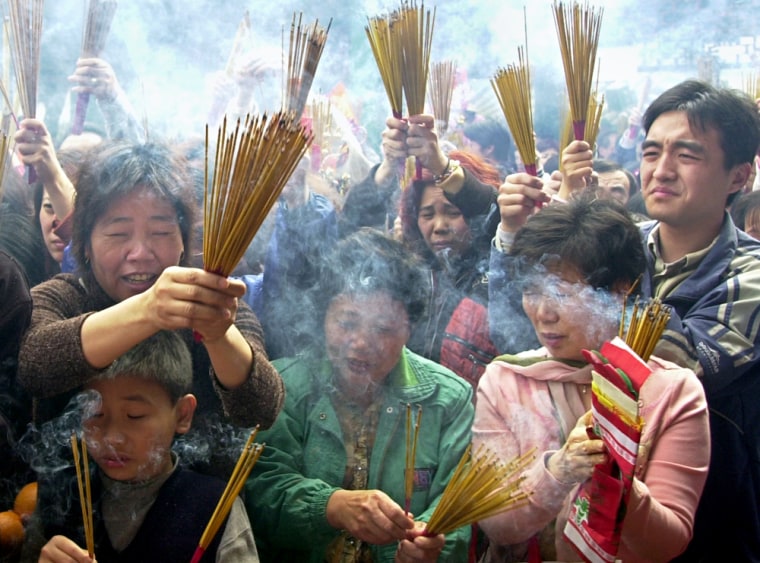A holiday calm fell over normally bustling cities Wednesday as ethnic Chinese communities across Asia celebrated the start of the lunar Year of the Rooster with visits to crowded temples and family banquets.
Businesses and government offices from Beijing to Singapore were closed to mark the passing of the Year of the Monkey and the beginning of year 4073 in the traditional Chinese calendar.
Celebrations in Thailand, Indonesia and Malaysia were muted in the aftermath of the deadly Dec. 26 tsunami.
In Beijing, a city of 14 million people, streets were nearly deserted as tens of thousands of people thronged temples in a freezing wind to burn incense and pray for good fortune.
The Yong He Gong temple associated with Tibetan Buddhism was so packed that police barred anyone else from entering. At the crowded White Cloud Temple, guards sprayed water on bathtub-size urns holding thousands of flaming incense sticks to reduce the risk of fire.
Elsewhere in China, millions of people who streamed out of cities to visit their hometowns for the most important holiday of the year were exchanging gifts and settling down to family feasts.
President Hu Jintao marked the holiday with a visit Tuesday to the home of a family from the impoverished Miao ethnic minority in China’s south. State television showed him patting a baby’s cheek and pounding rice in a traditional pestle.
Frenetic Hong Kong sleeps in
In frenetic Hong Kong, normally bustling streets and back alleys were empty as many people slept late after family dinners on the holiday’s eve.
Street vendors, who had been selling branches of peach blossoms, small potted tangerine trees and other seasonal items, abandoned their stalls Wednesday morning. Consumers quickly snapped up unsold goods that vendors discarded rather than paying to have them hauled away.
People lined up at the territory’s temples to be the first to plant a joss stick in incense burners. Believers crowded at the entrances, their eyes watering from the thick perfumed smoke.
“I hope there will be fewer natural disasters and accidents this year,” one unidentified man told Hong Kong Cable TV after burning an incense stick at a temple.
In Malaysia, where 30 percent of the population is ethnic Chinese, scores of people defied a ban on fireworks to set off firecrackers at midnight to mark the start of the new year.
Somber observance in tsunami zone
Celebrations were somber in the northern island of Penang, where most of Malaysia’s 68 tsunami deaths occurred.
Tan Lee Heng, his wife and three children were busy rebuilding their seafront home.
“I would naturally want to celebrate the Chinese New Year just like the others, but unfortunately we have lost everything,” Tan told Bernama news agency. “Our top priority now is to have a decent roof over our heads.”
In Taiwan, President Chen Shui-bian handed out 20,000 red envelopes containing 31 cents to residents in the southern farm village of Kuantien, his hometown. The red envelopes signify good fortune for the year ahead.
In central China, Buddhist monks at the famed Shaolin temple had orphans ring a bell 365 times in a ceremony to pray for peace and good fortune, the official Xinhua News Agency said.
